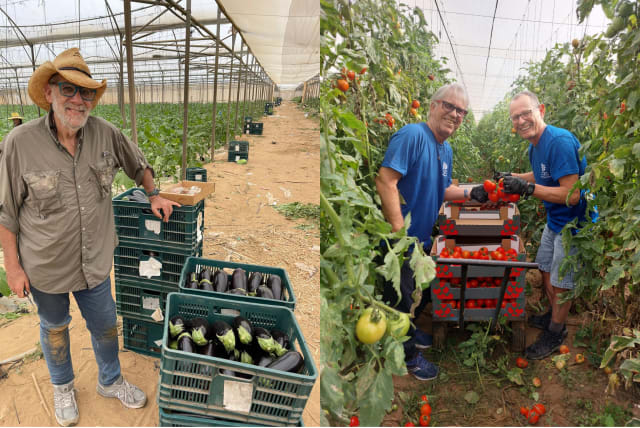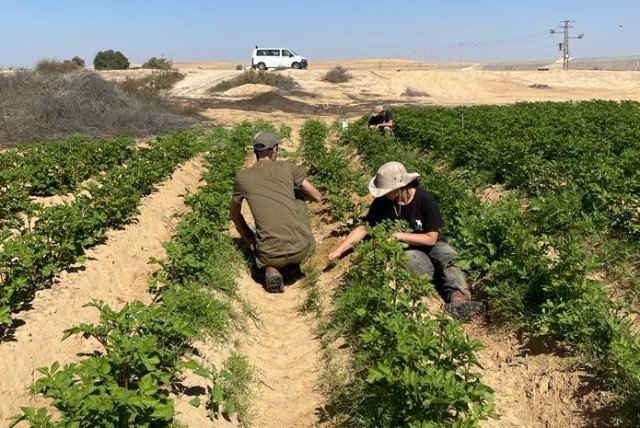The Swords of Iron War's impact on Israel's food sector

While prices may not reflect drastic changes yet, there's only so long that can last.
As the war between Israel and Hamas stubbornly endures well beyond its original two-month milestone, the intricate web of challenges ensnaring the nation’s food sector becomes increasingly apparent. A saga of profound shifts is unfolding.
Agriculture: Lingering uncertainties
The agricultural heartlands of Southern and Northern Israel, traditionally robust suppliers of the nation’s produce, now bear the scars of the ongoing conflict.“The first impacts on agriculture were the loss of crops due to physical damage to the fields and the inability of farmers to cultivate due to security reasons,” said Prof. Ayal Kimhi, a distinguished voice in agricultural economics at the Hebrew University and the Shoresh Institution for Socioeconomic Research.He underscored the dual blow of physical harm to fields and the challenge of cultivating amidst heightened security concerns. This has resulted in a substantial loss of agricultural output, a void partially filled by increased imports.As the conflict disrupted the supply chains and workforce availability, foreign laborers, concerned for their safety, retreated from the fields. “Some foreign workers were killed or kidnapped on October 7. In the South, others simply went back to their homes because of the situation, and Palestinian workers are now banned from entering Israel, making the agricultural labor shortage a nationwide challenge,” Kimhi explained.
The intricate dance between local production and imports, viewed by Kimhi as a strategy to minimize risk, is thrust into the spotlight. The increased reliance on imports hasn’t yet seemed to make a severe impact on prices, but that becomes less of a certainty the longer the conflict continues.Additionally, the loss of agricultural land and labor persists, influencing decisions about the upcoming seasons. “The loss of agricultural output may stay with us even for the next season, and maybe even longer,” warned Kimhi, painting a picture of enduring challenges and uncertainties.
Farmers’ voices echo against quotas and visa woes
As well as the practical challenges faced by farmers, there is also what to consider regarding the support – or lack thereof – being provided by the government.
This week, the Agriculture Security Conference witnessed a poignant development as Israeli farmers collectively voiced their concerns and frustrations through protests against government policies. During a panel discussion that brought together farmers from diverse regions, participants aired their grievances directly to Agriculture Minister Avi Dichter, expressing concerns about quotas, regulations, and stalled legislation designed to alleviate the challenges they face in their daily work.
Criticism was also directed toward the reduction in visas and limitations on hiring foreign workers, a stark contrast to the apparent surge in imports amid unfavorable market conditions.A significant aspect of the discussion revolved around the psychological warfare waged by Hamas on Thai workers, raising considerable apprehensions about their willingness to return to work.In response to these concerns, Dichter pledged commitment to a new reform that would empower farmers to cultivate based on their preferences and needs, rather than conforming to state-imposed quotas. However, the issue of visas for foreign workers remained a marked point of contention during the conference.Acknowledging the challenges faced by farmers at the war’s outset, Labor Minister Yoav Ben Zur detailed efforts to bring in workers from countries like India, Sri Lanka, and Moldova. This included individuals without permits or those requiring an extension of stay, signaling a multi-faceted approach to tackle the pressing labor shortages.
State of retail: Resilience amidst turmoil
The retail sector grapples with its own set of challenges. As Kimhi noted, “Whether it’s imported or locally produced, even processed food is affected, because it uses fresh produce as an input.”
In an interview with the Jerusalem Post, Keshet Teamim Supermarkets CMO Dani Bezalel reflected on the war’s impact on the retail sector. “The war has forced us to work in very difficult conditions, which proved once again that we as a company and all of the retail and especially supermarket industry are very important to the national ability to stay strong and to overcome hard times, as was proven before during Covid and through all the wars in the past,” he said.The delicate balance between sustaining local suppliers and managing the cost of living becomes apparent in Bezalel’s remarks: “It is a great challenge to maintain them, alongside maintaining the cost of living since, imports make it possible to lower the costs of the shopping-basket.”Kimhi further underscores the potential ripple effect on prices, noting that manufacturers may resist immediate price hikes but could face sustainability challenges in the long run. “You shouldn’t expect to see an immediate effect on prices because some of these manufacturers do not want to increase prices, even if their inputs become more expensive,” he explained. “But they cannot sustain that for a long time. So we may see prices increasing in the more immediate and longer range.”As Israel navigates the complexities of the ongoing conflict, the intertwined challenges in agriculture and the retail sector underscore the multifaceted impact of the Hamas war on the nation’s food security and economic stability.The intricate dance between government support, farmer activity, and retail resilience paints a vivid picture of a nation grappling with formidable challenges as stakeholders across the food sector strive to find a delicate balance between immediate needs and long-term sustainability.
Jerusalem Post Store
`; document.getElementById("linkPremium").innerHTML = cont; var divWithLink = document.getElementById("premium-link"); if (divWithLink !== null && divWithLink !== 'undefined') { divWithLink.style.border = "solid 1px #cb0f3e"; divWithLink.style.textAlign = "center"; divWithLink.style.marginBottom = "15px"; divWithLink.style.marginTop = "15px"; divWithLink.style.width = "100%"; divWithLink.style.backgroundColor = "#122952"; divWithLink.style.color = "#ffffff"; divWithLink.style.lineHeight = "1.5"; } } (function (v, i) { });


